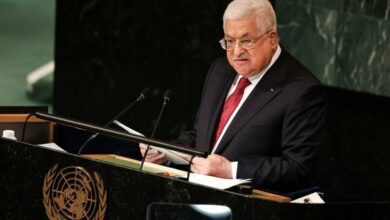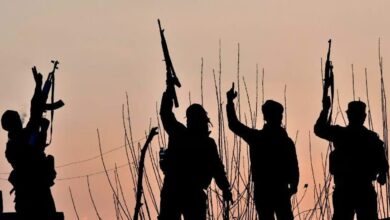Israel promises to ‘complete the job’ in Gaza as a member of the War Cabinet threatens to withhold Rafah until Ramadan
Defying mounting calls to halt the military offensive in Gaza, Israeli Prime Minister Benjamin Netanyahu on Sunday vowed to “finish the job” and threatened to invade the southern city of Rafah if the remaining Israeli hostages are not released by the approaching Muslim holy month of Ramadan.

The timetable for a ground invasion of Rafah, where more than half of the 2.3 million Palestinian enclave residents have sought safety, has not been made public by the Israeli administration. Among Netanyahu’s three War Cabinet members is retired general Benny Gantz, who has a powerful voice but not the ultimate say-so on future developments.
“The fighting will continue to the Rafah area if by Ramadan our hostages are not home,” Gantz warned a gathering of Jewish American leaders. Expected to start on March 10, Ramadan is known to be a difficult period in the area.
At the morgue of Al Aqsa hospital in Deir al Balah, Gaza Strip, Palestinians scream Islamic slogans as they carry the corpses of children killed in Israeli attacks.
US vows to obstruct a fresh vote on Gaza in the UN Security Council
As the cease-fire talks falter despite recent indications of improvement, Netanyahu has referred to demands made by the Islamist Hamas organization that rules Gaza as “delusional.”
The leading ally of Israel, the United States, says it remains committed to mediating a cease-fire and hostage-release arrangement and sees a more comprehensive settlement of the conflict that was ignited by Hamas’ fatal strike in southern Israel on October 7.
Along with threatening to veto another draft resolution advocating for a cease-fire, the United States has cautioned against actions that would compromise “the opportunity for an enduring resolution of hostilities.”
However, Netanyahu is against Palestinian statehood, which the United States regards as a crucial component of a larger plan for Israel and Saudi Arabia to normalize ties. Israel “categorically rejects international edicts on a permanent arrangement with the Palestinians,” according to a statement agreed by his Cabinet on Sunday. It also opposes any unilateral establishment of a Palestinian state.
At the morgue of Al Aqsa hospital in Deir al Balah, Gaza Strip, Palestinians scream Islamic slogans as they carry the corpses of children killed in Israeli attacks.
Famine is the most recent menace in Gaza’s bombed-out north.
An independent state for the Palestinians as a component of a future peace deal has the overwhelming backing of the international community. There are several hardliners in Netanyahu’s cabinet who are against Palestinian independence.
Netanyahu desires that Israel defeat Hamas “totally.” He has said that Palestinian people would be evacuated in response to international concerns of an onslaught by Rafah. It’s unclear where they will move in the mostly destroyed Gaza.
The head of the World Health Organization said that Nasser Hospital, the primary medical facility in southern Gaza, “is not functional anymore” after an Israeli military strike on the facility in Khan Younis last week, coinciding with the proposed timetable of the operation.
Medics and witnesses report that Israeli attacks in Gaza continued overnight into Sunday, killing at least 18 Palestinians. A attack in Khan Younis, the primary focus of the southern Gaza onslaught in recent weeks, killed five people, while another in Rafah killed six, including a lady and three children. Journalists with Associated Press seen the corpses.
“Everyone who was killed was someone the Jews requested be relocated to safe areas,” Ahmad Abu Rezeq, a spectator, said during the Rafah attack.
Three ladies and seven other individuals were killed, including an air attack that destroyed a house in Gaza City, which was severely damaged early in the conflict, according to a relative named Sayed al-Afifi.
Because Hamas operates in densely populated areas, Israel’s military seldom comments on specific attacks and places the responsibility for civilian losses on the terrorist organization.
UN claims facilities under raid are no longer operational
On Friday and Saturday, a WHO delegation was not permitted entry into Nasser Hospital, according to WHO Director-General Tedros Adhanom Ghebreyesus. He said around 200 patients are left, 20 of whom need immediate referrals to another facility, in a post on X.
Yoav Gallant, the Israeli Minister of Defense, said that at least 200 militants turned themselves in at the hospital. Additionally, he said that Hamas is essentially leaderless in Gaza and that Hamas has been defeated in Khan Younis. He provided no proof to back up his statements.
According to the Gaza Health Ministry, 150 people were left without medical attention after 70 medical professionals and patients were detained. It claimed that Israel blocked the evacuation of patients—including infants—to other medical facilities.
The military claims that it does not target physicians or patients; rather, it is searching Nasser Hospital for the bodies of hostages.
Approximately 1,200 people, primarily civilians, were murdered and 250 were taken captive in the assault on October 7. Approximately 130 hostages are still being held by militants; 4 of them are thought to be dead. In November, following a week-long cease-fire, the majority of the others were freed.
The Health Ministry, which does not differentiate between fighters and civilians, reports that at least 28,985 Palestinians have died in the conflict, the majority of whom being women and children. It said on Sunday that 127 corpses had been transported to hospitals on the previous day.
In Gaza, around 80% of the population is displaced, and 25% is starving. According to Wael Abu Omar, a representative for the Palestinian Crossings Authority, four trucks carrying cooking gas came via the Rafah crossing with Egypt on Sunday, while 123 relief vehicles entered Gaza through Israel’s Kerem Shalom border gate. That is much less than the 500 trucks that entered each day before to the conflict.
At the morgue of Al Aqsa hospital in Deir al Balah, Gaza Strip, Palestinians scream Islamic slogans as they carry the corpses of children killed in Israeli attacks.
Famine is the most recent menace in Gaza’s bombed-out north.
When Israeli soldiers attempted to apprehend an armed suspect in the town of Tulkarem, they were met by gunfire in the occupied West Bank. According to the military, the suspect was slain and a paramilitary Border Police officer in Israel suffered serious injuries. A senior militant was identified as the raid’s target. Two Palestinians were killed, according to the Palestinian Health Ministry.
There is a chance that the Gaza War may lead to further regional violence. According to the U.S. Central Command, five self-defense attacks were carried out on Saturday against drones and cruise missiles in a region of Yemen that the Iranian-backed Houthi rebel group controls.
The US is against a fresh cease-fire agreement.
A draft resolution opposing the forcible displacement of Palestinians and calling for an urgent humanitarian cease-fire and unrestricted humanitarian access to Gaza has been circulated by Algeria, the Arab representative on the U.N. Security Council.
The plan “will not be adopted,” according to U.S. Ambassador Linda Thomas-Greenfield, and it contradicts Washington’s attempts to put a stop to the violence. Previous resolutions with broad international backing were vetoed by the United States.
After weeks of negotiations, the US, Qatar, and Egypt have failed to secure a cease-fire and the release of the hostages. Qatar said on Saturday that the discussions “have not been progressing as expected.”
According to Hamas, until Israel ends the conflict and leaves Gaza, it will not free all of the captives that are still held there. It also calls on Israel to liberate hundreds of Palestinian prisoners, including prominent terrorists.







